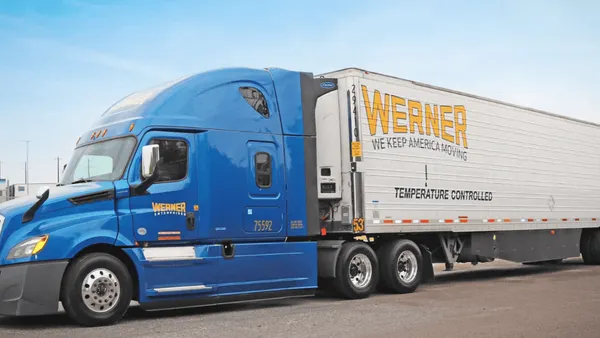Dive Brief:
- Daseke's flatbed business has performed "better than normal," COO Rick Williams said, despite slowdowns in the construction market. "Our flatbed companies have really seen freight hold up really well this winter," Williams said.
- New home construction fueled flatbed demand in 2020, DAT Principal Analyst Dean Croke wrote in a recent company blog post, citing data from the U.S. Census Bureau. Numbers from the Federal Reserve on industrial production, which DAT considers a reliable indicator of flatbed demand, increased 1.6% MoM in December.
- But "spending on private nonresidential construction in November was 9.5% below 2019 levels," Croke wrote. Contractors project that 13 out of the 16 construction categories, including residential, will shrink in 2021, according to the Associated General Contractors of America.
Dive Insight:
Daseke's flatbed portfolio is diversified and includes niches, a strategy the company built prior to the coronavirus. Construction-related hauls typically account for about 27% of Daseke's revenue, Williams said. Another significant portion is made up of what he calls "freight of all kinds."
During 2020, wind energy and high-security cargo, for example, helped lift the company's Q3 2020 earnings, said former CEO Chris Easter last October.
And Williams said some of Daseke's manufacturing customers project a strong year. "Our roofing manufacturers, for example, are telling us that they expect another strong year in 2021. Lumber pricing is extraordinarily high right now," Williams said. Lumber prices are up some 78% YoY, according to Nasdaq. "We do a lot of work for various siding materials; they expect a good year."
The health of the sector is regional, too. For example, the home-building industry in the Pacific Northwest is "going crazy," Williams said, while certain sectors of the Southeastern market seem to lag in recovery.
But whether it's home-building or commercial doesn't make too much of a difference to Daseke, as it could be hauling the same product to each type of project.
Daseke has recently trimmed down its portfolio through consolidation. When the company announced this month that Easter had retired, he lauded Daseke in a statement for "successfully [executing] a dramatic turnaround in our performance while navigating through a global pandemic."
When diverse customer portfolios are strategic, they have separated companies that have maintained business during the market downswings from those that have struggled mightily. The Council of Supply Chain Management Professionals' State of Logistics Report, released in June, recommended fleets diversify revenue mix to manage risk amid market volatility.
Old Dominion Freight Line is continually an example of such a business model can breed success. The firm pursues shipping clients that need a variety of freight hauled, including tires, medical items, retail and food. Old Dominion reported 6.3% YoY revenue growth in November, which it attributed to a 5.2% increase in LTL tons per day and an increase in LTL revenue per hundredweight.
A diverse portfolio also allows trucking firms to reallocate resources from a down segment to one on the upswing. J.B. Hunt demonstrated this ability last spring as a quick response to the virus' proliferation. The firm said in April it balanced declines in office furniture and automotive supplies with increases in food-related business.
"Some of the industries have been majorly impacted by COVID, right? Aerospace, is one of them," Williams said. "But we've been able to reallocate our assets to other industries that may be up ... So that's the ability of Daseke, to shift its assets to the markets that are doing well and still maintain our space in markets that may be down."












